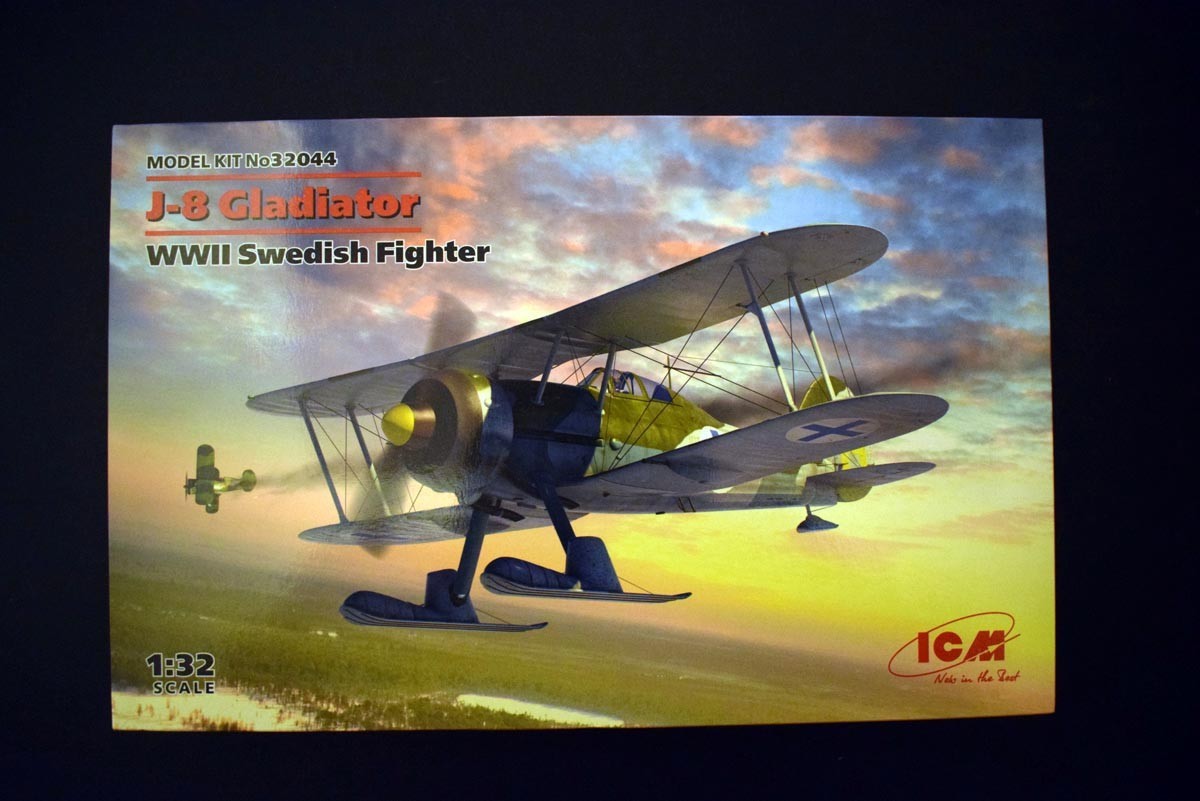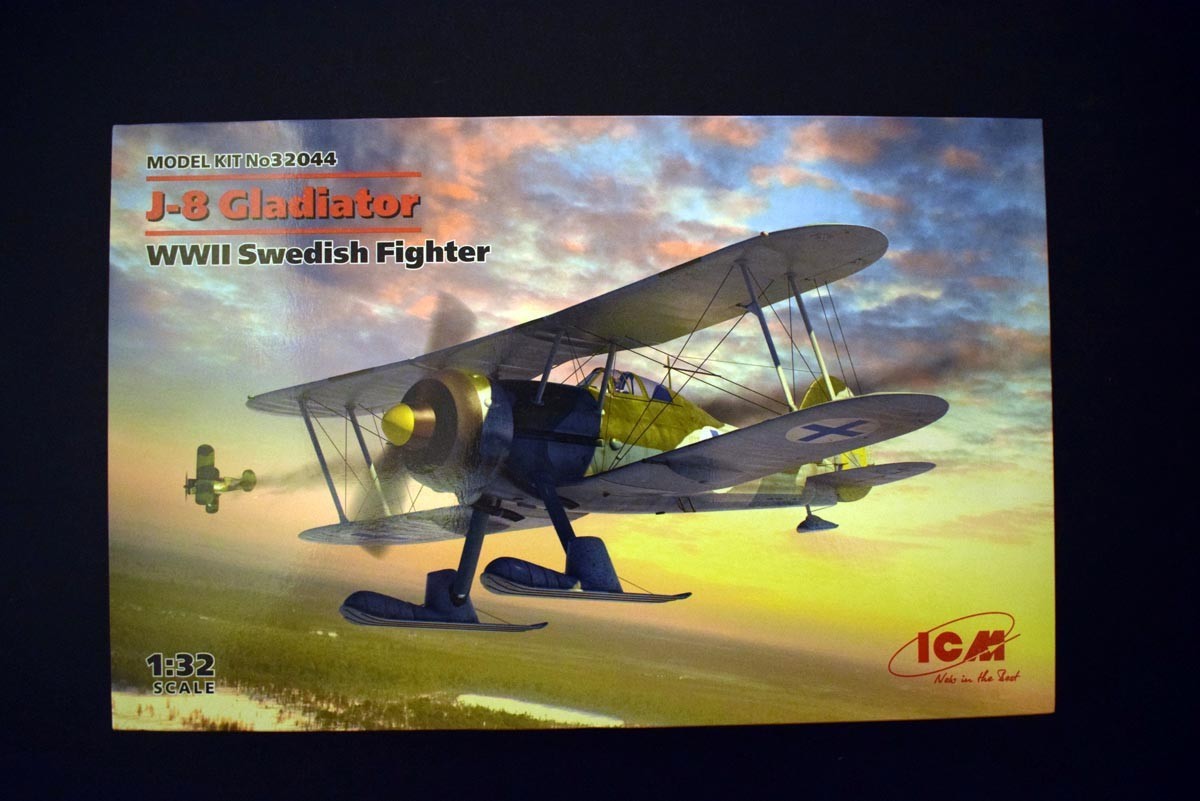
Introduction
The following introduction is as provided by ICM:
In 1936, a new defence resolution was made by the Swedish defence ministry to organise one fighter and four bomber wings in light of rising tensions in Europe. After a selection process, the Gloster Gladiator was found to be the aircraft most suited to requirements, and an order was made for55 aircraft, which were to be locally fitted with engines and armament. The first Gloster Gladiator was delivered to the Swedish Air Force on April 15th1937 and locally designated as the ‘Jakt plan 8’ (J8). While the first few Swedish Gladiators fitted with the Fairey three-bladed propeller, the decision was taken to switch back to the earlier fixed-pitch two-bladed wooden propeller.
Review
This offering is supplied in the now usual flip top cardboard box favoured by ICM with a second separate card lid with the artwork on it; as a modeller I do appreciate a well packaged offering and I feel ICM is one of the best in this respect. The artwork on the lid is very nicely done and will draw your eye to the box and provides a very appealing image. Inside the box is an instruction booklet with the decals protected between the pages. The sprues are packed inside a re-sealable plastic bag with a further bag holding the clear parts for the aircraft in a bag of their own.
An examination of the contents leaves me happy as the plastic suffers from some flow lines which do not look or feel to have caused any issues with the finish of the parts. The clear parts of the model have a nice thinness to them and this has resulted in no obvious lens magnification that I could see across the parts. The decals have great colour but feel a little on the thick side which may result in issues during application.
As with most models the construction begins with the cockpit and for the most part this area has been accurately detailed. The build of this area requires very little effort on the part of the modeller if built from the box, but there is plenty that can be added to improve the area. So let’s start with what is missing, inaccurate or needs help. The release arms for the cockpit doors need some help as the detail of the actuator is weak, but the structure present is very good. It is worth noting that the left hand door was the usual one to use as the one on the right was only really used in an emergency.
The frame detail in the cockpit is generally correct as regards structure, but the form could be greatly improved if you wish to go to work on it. Areas such as reinforcing shapes are missing from where they should be, but once closed up there is not much you can see. The instrument panel in the Gladiator is in two pieces. The upper panel is a perfect match for a Mk 1Gladiator in every detail, but the lower panel is haphazard in that most of what is there is generally accurate, but there is missing detail. Please note that the Mk II instrument is different and so do not confuse the two. This is a Mk 1 aircraft in its base form.
The feed shoots for the fuselage-mounted machine guns are missing, but the detail that is present is good enough for what can be seen, though there is plenty of room for improvement. The muzzles will need drilling out in all four machine guns located in the fuselage and under the wings, or like me you can add barrels from Master that are a big improvement. The barrels from Master are longer than those in the model and so I have to question the accuracy of those supplied by ICM. I noted that the Swedish fitted the own weapons and so while very little can be seen of the MG body it would I suggest be wrong for this aircraft.
Annoyingly ICM has again failed to supply any harness detail for the seat, but with this kit having initially been released some time ago there is a good amount of aftermarket options out there. Looking at what is available for the cockpit I am pushed towards what Eduard offers as it would seem to cover all of the weaknesses I am concerned about with the exception of the reinforcement parts of the frame’ the frame parts could easily be scratched with a little research.
The triangular cut out in the seat is correct.
The Mk II reflector gun sight is very well-detailed as regards shape and form. But the modeller will need to add the clear portion of the sight.
So to generalise what is supplied is correct, but the modeller could throw a lot more at this area of the model in order to add some stunning visual appeal.
Moving onto the fuselage, there is a problem: the fuselage halves are bowed out along their length, but with a little care they can be brought back together; I have come across this on a couple of occasions and so I believe it is an issue with the packing causing pressure and so causing the bow, but as the interior elements are added the alignment of the fuselage is much easier to obtain, at least that is what I found when building the initial release. The detail on the fuselage panel detail is exceptionally accurate along the sides and top of the fuselage. I am really impressed with the effort that ICM has put into the detail on the fuselage. You will need to do some filling of the mating surfaces, but that is not exactly an unheard-of issue with any manufacturer. The fitting of the fuselage in the front of the cockpit is the area that bugs me as it will fight you and due to the plastic being thin; it will be easily distorted by pressure. Once you get it closed up the result is generally pleasing and accurate; the addition of some Mr. Surfacer 500 and light sanding will correct the issues found here. There are some holes that need to be drilled in this release and bulbous protrusions added, I believe these are to accommodate the new MG.
The wings are a thing of beauty in this release from ICM. The profiles from above and head on look to be a perfect match. The detail provided is exceptionally accurate with the modeller just needing to consider the placement of the aerial mounting on the upper wing. I pre-drilled the wings ready for tensioning cables that will be added and I was very pleased to see the effort ICM has gone to in order to provide detail on that aspect. The flight control elements have been supplied as separate parts and so the modeller could opt to position them as wished. Another nice aspect is that the four wing supports furthest from the fuselage have well designed recesses for the support to sit in and creates a really strong bonding area.
The finesse of the wings does mean that great care is needed when removing the parts from the sprue, and I did find that cutting the locators off at the end of the wings resulted in nicer joints. Every high needs a low and that low is the support arms from the fuselage to the upper wing; no matter what I tried the fit was never perfect and some filler is needed. Regardless of that I am really pleased with this area of the model. The tail of the aircraft has also been well tackled well and is again accurate as regards my reference. I again like that ICM has provided all of the control surfaces as separate parts allowing the modeller to place as desired on the model. A particularly nice touch in the offering is the detail provided for stringing the aircraft which is exceptional and beyond repute.
The undercarriage of the model can be wheels or skids, I feel if you have opted for this release then go for the skids due to the very different look you get. If you choose other wise and go for the wheels you are well catered for in that regard, but I really like the shape and form of the skids. The engine is an issue for me as it was clearly said that the Swedish fitted their own engines (due to the cold I suspect), but ICM has provided the same engine. This engine has a fantastic level of detail for plastic only , but due to new engine covers being provided I am guessing it is not a scale replica of what was fitted. If you know I am wrong please chime in.
Conclusion
This is the fifth release of the Gloster Gladiator and it is not getting old for me. I do wish they would address the harness detail in the cockpit as the most obvious missing detail. The failure to supply a modified engine and machine guns would seem to be the biggest accuracy issues and I would have liked to have the three bladed propeller included if you wished to show an aircraft as it was delivered. With the complaints out of the way I am really impressed with the effort put into showing how to string the model; there are four images to make clear what belongs where. Lastly I like that ICM has provided patterns for creating your own masks for the cockpit glazing.

